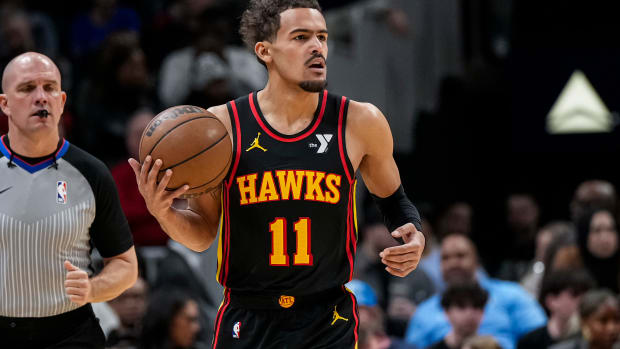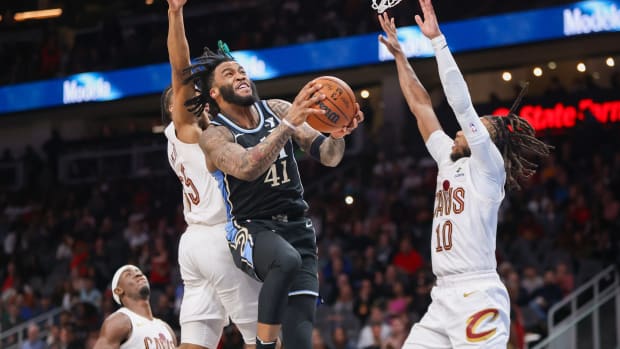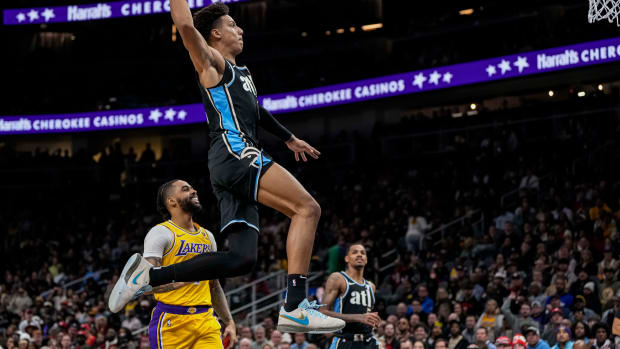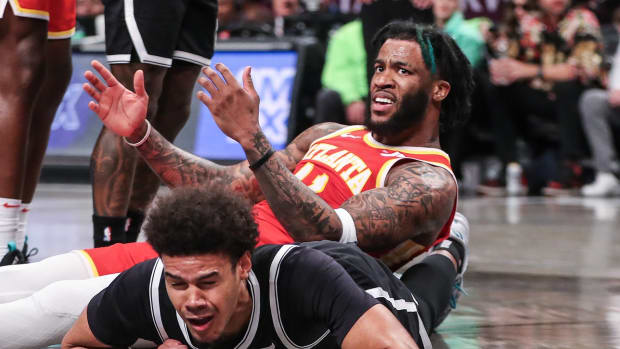Three-Point Play: Hawks Fizzle Out Against Suns
The shorthanded Hawks dropped their second game of their current road trip in Phoenix Thursday night, falling 128-112 to the Suns. Atlanta entered the game already down a key wing after the team announced Kevin Huerter would miss the next two weeks with a shoulder injury, and saw both DeAndre’ Bembry and Cam Reddish dubiously ejected over the course of Thursday’s contest. All either player could do was smile in disbelief as he departed the court, an expression that could just as easily have served as an avatar for Hawks’ night.
What began as a promising offensive start quickly devolved into sloppy play, and once Atlanta became mired in its first rut, it couldn’t seem to break out of it. It felt as though Atlanta couldn’t seem to figure out the flow of the game and spent most of the night trying to blindly navigate their way through missed shots, frustrating calls, and broken possessions.
Lloyd Pierce and his team didn’t look angry or deflated so much as they seemed confused at how the game twisted and turned, continually in Phoenix’s direction. Save for a brief second-half run sparked by a basket interference call on the Suns’ Dario Šarić, there was very little momentum working in Atlanta’s direction during the second half.
Phoenix, meanwhile, continued the red-hot shooting and crisp defense that has lifted it to a 7-4 record – one of the best and most surprising marks in the Western Conference. Devin Booker finished the night with an easy 27 points and seven assists while Kelly Oubre exploded for a season-high 30 points on just 18 shots. As a team, Phoenix posted an effective field goal percentage of 57.1 and made 31-of-38 from the foul line. They controlled the rim and the 3-point line – two critical factors in a team’s offensive and defensive efficiency.
Here’s what else stood out from a mystifying game:
Atlanta’s big men, finally stepping up
Perhaps the Hawks’ lone offensive bright spot was that the frontcourt, as a group, its best game of the season by a wide margin. Damian Jones started again at center, and for the second consecutive game both he and previous starter Alex Len benefitted from the change. Jones kept the offense moving with decisive and accurate passes to shooters out of the short roll while his hands and footwork looked better than they have all season. He finished with 14 points on 7-of-8 shooting in just 19 minutes (he committed five fouls in that time) and offered Trae Young a competent lob threat in the pick-and-roll for the first time since John Collins last played.
That could make Jones an integral element of Atlanta’s offense, which has lacked vertical punch since Collins went out and therefore been unable to fully unlock Young. Jones isn’t as quick or coordinated around the basket as Collins, but he puts pressure on opponents to take away the lob. That opens up lanes for Young to finish through and windows for him to find shooters – provided he can’t find Jones at the rim first:
Len is more controlled and ground-bound in the pick-and-roll, but has been similarly effective the last two games. He rolled to a season-best 21 points in 26 minutes against Phoenix, and while that production mattered little the grand scheme of the loss, Len’s ability to provide it could be a lifeline for the Hawks moving forward. He has limitations that his team will always have to live with, but in the right capacity, Len can be a useful ancillary weapon. His jumper must fall for him to be anything more than an average backup, but if his shot comes around, the Hawks may have found the right role for the big man.
Jabari Parker continued an impressive stretch with another 24 points and seven rebounds Thursday. He has approximated Collins’ production better than most imagined, and if he continues playing this way when Collins returns, Pierce may have to consider starting the two together.
Despite playing Jones and Len a combined 44 minutes, Pierce found 15 minutes for Bruno Fernando – mostly at power forward. Rather than pulling De’Andre Hunter early in each half and reinserting him as the power forward on second units, Pierce gave Parker the quick hook and used two-center alignments until Parker came back in with the second team. Pairing Fernando with Jones or Len won’t be sustainable against every opponent, but if the Hawks can tread water with that look until Collins returns, it gives Pierce a way of redistributing the frontcourt minutes and avoiding overtaxing Parker and Hunter.
De’Andre Hunter’s intrusion
Most of De’Andre Hunter’s defensive value comes from his versatility, positioning, and intelligence. He almost always makes the correct rotations and rarely allows his man an easy look. He simply doesn’t make many mistakes. This year, the Hawks have tried to coax the ballhawk out of Hunter and turn him into a more impactful playmaker rather than just a solid team defender. Thursday night offered evidence of what that might look like as Hunter poked six steals from the Suns and seemed more comfortable putting himself into the fray on defense.
Twice Hunter crashed in from the weak side to break up an entry pass. Late in the game, he stripped Oubre in transition to save a layup. As he’s grown more comfortable within Atlanta’s schemes and rotations, Hunter has become more aggressive making these sorts of plays:
He may not have the anticipation and instincts to fly around and singlehandedly bust opponents’ plays like Matisse Thybulle does, but Hunter certainly has the tools and wherewithal to become more disruptive. He isn’t prone to gambling, but could afford to take more calculated risks like he did on Thursday.
Trae Young cannot do this alone
There isn’t a clear solution to the current lack of playmaking on Atlanta’s roster. Kevin Huerter’s shoulder injury robbed the Hawks of their only above-average shooter and playmaker apart from Young, and Atlanta is feeling the limitations of its rookies and role players. Pierce has little choice but to play Young as many minutes as possible, and given how hard the point guard must work to get open and find his teammates, those minutes tax him a great deal.
Pierce, however, doesn’t have many better options through which to channel his team’s offense. Bembry is the team’s next-best decision-maker, but a player with such profound shooting limitations can only have so great an impact. Parker has given the Hawks some verve in the frontcourt, but as well as he creates for himself, he doesn’t have quite the vision or feel to galvanize the rest of the offense. Hunter looks the part of a secondary playmaker at times and hardly poses a threat at others.
Young will have games in which he’s good enough to carry the Hawks through slogs and off-nights from teammates. But as his minutes and workload add up, he’ll need some source of relief. Right now it’s unclear where that might come from.
Bonus: Enough charge-baiting
I am fine with an honest, well-earned offensive foul. Should an offensive player lose control of his body and barrel into a defender or create additional separation with an elbow or shoulder extension, reward the defender and send possession the other way. But standing directly behind a moving offensive player or planting yourself in front of an airborne shooter without making a play on the ball is not basketball and should never be rewarded.
The charge-drawing movement has become out of control in the NBA (and all levels of basketball), and perhaps no team hunts offensive fouls as egregiously as Phoenix. Aron Baynes, one of the NBA’s elite rim protectors and biggest human beings, has made a habit of stepping in front of driving defenders and falling over despite having every necessary tool to contest shots:
Not only do those plays take away some of the most exciting moments of a basketball game, they’re extremely dangerous. Remember, it was Baynes fell and broke Steph Curry’s hand after taking a charge earlier this month. Once a player leaves the floor, he doesn’t have much control over where and how he lands if another person upends him.
The Hawks committed 10 offensive fouls on Thursday, four of which came from various Suns blind-siding big men as they rolled to the rim:
Is this really what we want? Does anybody enjoy watching that? These calls are so easy to legislate out of the game, yet referees continue to bite on these traps. And it isn’t Phoenix’s fault! Baynes, Ricky Rubio, and the Suns are simply taking advantage of a set of rules that incentivizes dangerous and annoying plays. Stop rewarding the action, and players will stop committing them in the first place.
Some advocates of the charge will argue that taking offensive fouls are a sign of defensive effort and toughness. They are, in fact, the opposite. Challenging a shot at the rim or making an effort to take the ball requires far more effort and toughness than grabbing hold of one’s crotch and toppling to the floor.
There’s a middle ground between abolishing the charge entirely and whatever is going on now. But it’s abundantly clear that the NBA must tone down the epidemic with a rule change of some kind. From players being injured to fans being subjected to maddening calls, we’re all suffering from charge fatigue.





